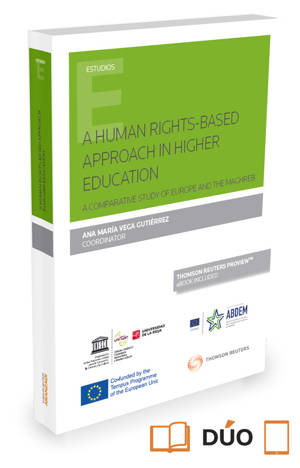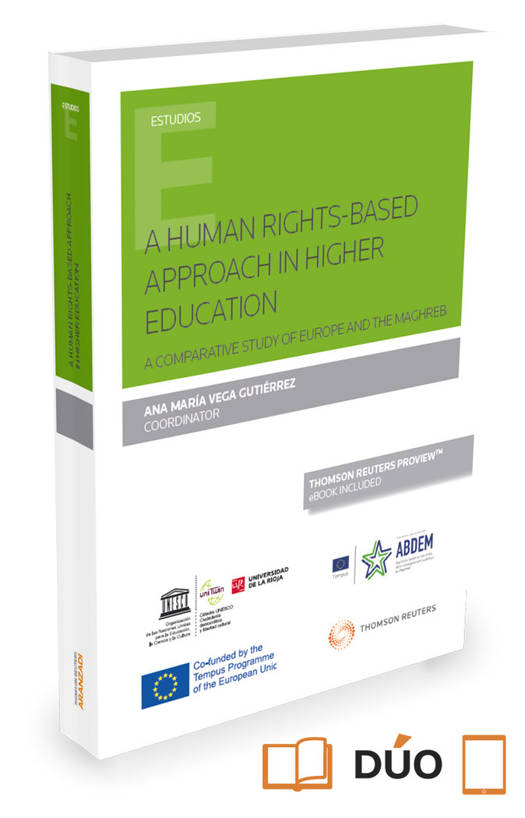
Vous voulez être sûr que vos cadeaux seront sous le sapin de Noël à temps? Nos magasins vous accueillent à bras ouverts. La plupart de nos magasins sont ouverts également les dimanches, vous pouvez vérifier les heures d'ouvertures sur notre site.
- Retrait gratuit dans votre magasin Club
- 7.000.000 titres dans notre catalogue
- Payer en toute sécurité
- Toujours un magasin près de chez vous
Vous voulez être sûr que vos cadeaux seront sous le sapin de Noël à temps? Nos magasins vous accueillent à bras ouverts. La plupart de nos magasins sont ouverts également les dimanches, vous pouvez vérifier les heures d'ouvertures sur notre site.
- Retrait gratuit dans votre magasin Club
- 7.000.0000 titres dans notre catalogue
- Payer en toute sécurité
- Toujours un magasin près de chez vous
A human rights-based approach in higher education (Papel + e-book)
Naouel Abdellatif Mami, Faten Ben Lagha, Michelle Brunelli, Zoila Combalía Solís, Abdes El Ouazzani
Livre | Espagnol
68,95 €
+ 137 points
Description
The International community has expressed, with a growing consensus, that education in human rights contributes positively to their implementation. Consistent with this objective, on the 10th of December 2004, the United Nations General Assembly announced the World Programme for Human Rights Education. Higher education represents one of the two priority areas within the second phase of this global programme. Through its basic functions (research, teaching and the provision of community services), higher education institutions carry out the social responsibility of providing ethical education to citizens committed to peace building and defending human rights and democratic values. In addition, they are also committed to generating global knowledge to face the current challenges of human rights, such as eradicating poverty and discrimination, post-conflict reconstruction, sustainable development and multi-cultural understanding. However, most university institutions pay little attention to this issue and in very few cases are these objectives included in the concept of quality education. This work is the result of a European Project TEMPUS Approche basée sur des droits dans l'enseignement supérieur au Maghreb (Human rights-based approach to higher education in the Maghreb - ABDEM). The project intends to contribute to enrich higher education programmes in the Maghreb region by introducing a human rights-based approach. This perspective, which is very new in all the countries, introduces considerable progress in the university institution as it intends to generate new impetus in society, that can promote democratisation and the adoption of human rights within cultural and social-political contexts in the Maghreb, from the standpoint of training, management and governance of the university institutions. This work addresses a balance of the twelve European and Maghreb institutions that participate in the project, using a new tool that consists of the construction and selection of a group of indicators. Regarding the assessment tool, indicators are devised as an input to provide knowledge and evidence in matters such as performance and good practices for decision makers in the field of Higher Education, both at the corresponding national and individual university level. As such, the indicators should contribute, not just to assess interventions, but also to provide an aggregate value so the processes leading to decisions that contribute to improving current and future activities, projects, programmes, strategies and politics linked to the integration of the Human Rights-based Approach in Higher Education.
Spécifications
Parties prenantes
- Auteur(s) :
- Editeur:
Contenu
- Nombre de pages :
- 590
- Langue:
- Espagnol
Caractéristiques
- EAN:
- 9788491522676
- Date de parution :
- 01-04-17
- Format:
- Livre
- Dimensions :
- 165 mm x 235 mm
- Poids :
- 832 g







